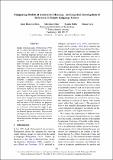| dc.contributor.author | Shen, Judy Hanwen | |
| dc.contributor.author | Hofer, Matthias | |
| dc.contributor.author | Felbo, Bjarke | |
| dc.contributor.author | Levy, Roger | |
| dc.date.accessioned | 2021-11-03T14:30:07Z | |
| dc.date.available | 2021-11-03T14:30:07Z | |
| dc.date.issued | 2018 | |
| dc.identifier.uri | https://hdl.handle.net/1721.1/137193 | |
| dc.description.abstract | © 2018 Association for Computational Linguistics. Simple reference games (Wittgenstein, 1953) are of central theoretical and empirical importance in the study of situated language use. Although language provides rich, compositional truth-conditional semantics to facilitate reference, speakers and listeners may sometimes lack the overall lexical and cognitive resources to guarantee successful reference through these means alone. However, language also has rich associational structures that can serve as a further resource for achieving successful reference. Here we investigate this use of associational information in a setting where only associational information is available: a simplified version of the popular game Codenames. Using optimal experiment design techniques, we compare a range of models varying in the type of associative information deployed and in level of pragmatic sophistication against human behavior. In this setting we find that listeners’ behavior reflects direct bigram collocational associations more strongly than word-embedding or semantic knowledge graph-based associations and that there is little evidence for pragmatically sophisticated behavior by either speakers or listeners of the type that might be predicted by recursive-reasoning models such as the Rational Speech Acts theory. These results shed light on the nature of the lexical resources that speakers and listeners can bring to bear in achieving reference through associative meaning alone. | en_US |
| dc.language.iso | en | |
| dc.publisher | Association for Computational Linguistics | en_US |
| dc.relation.isversionof | 10.18653/v1/k18-1029 | en_US |
| dc.rights | Creative Commons Attribution 4.0 International license | en_US |
| dc.rights.uri | https://creativecommons.org/licenses/by/4.0/ | en_US |
| dc.source | Association for Computational Linguistics | en_US |
| dc.title | Comparing Models of Associative Meaning: An Empirical Investigation of Reference in Simple Language Games | en_US |
| dc.type | Article | en_US |
| dc.identifier.citation | Shen, Judy Hanwen, Hofer, Matthias, Felbo, Bjarke and Levy, Roger. 2018. "Comparing Models of Associative Meaning: An Empirical Investigation of Reference in Simple Language Games." CoNLL 2018 - 22nd Conference on Computational Natural Language Learning, Proceedings. | |
| dc.contributor.department | Massachusetts Institute of Technology. Media Laboratory | |
| dc.contributor.department | Massachusetts Institute of Technology. Department of Brain and Cognitive Sciences | |
| dc.relation.journal | CoNLL 2018 - 22nd Conference on Computational Natural Language Learning, Proceedings | en_US |
| dc.eprint.version | Final published version | en_US |
| dc.type.uri | http://purl.org/eprint/type/ConferencePaper | en_US |
| eprint.status | http://purl.org/eprint/status/NonPeerReviewed | en_US |
| dc.date.updated | 2021-04-06T18:19:02Z | |
| dspace.orderedauthors | Shen, JH; Hofer, M; Felbo, B; Levy, R | en_US |
| dspace.date.submission | 2021-04-06T18:19:03Z | |
| mit.license | PUBLISHER_CC | |
| mit.metadata.status | Authority Work and Publication Information Needed | en_US |
